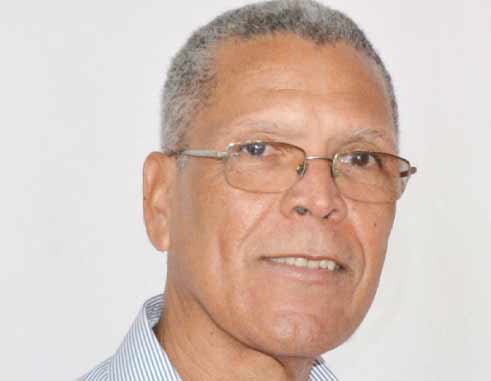 LAST time we checked, Helen was still stuck in that IMPACS mud. Good citizens are all lined up to help push, but latest word is that we have hired an expensive US based legal committee to further debate whether or not we’re really and truly stuck. Citizens remain on stand-by.
LAST time we checked, Helen was still stuck in that IMPACS mud. Good citizens are all lined up to help push, but latest word is that we have hired an expensive US based legal committee to further debate whether or not we’re really and truly stuck. Citizens remain on stand-by.
This is not a new approach – we have a committee in place for every problem that we face, and we extol the virtues of the consultative process in arriving at the solutions which they propose. Implementation, however, is an entirely different matter, and Constitution reform readily comes to mind.
But, to the phrase at caption. It’s not an original phrase, borrowed as it is from Dr. Clyde Mascoll’s introduction to his commentary in the NATION Newspaper of February 4, 2016. Dr.Mascoll in turn attributes the phrase to Carl (sic) Moore indicating that the observation was made with direct reference to political leadership. Questions on leadership were raising their heads in Barbados in the same week that in Saint.Lucia, the National Principals’ Association held their third Annual Education Conference which had as its theme “Effective Leadership”. In addressing this Conference, our Prime Minister also offered his views on leadership.
It is good that the subject is receiving the attention that it is, and we note the earlier contribution of VOICE commentator Clement Wulf-Soulage in this regard (October 3, 2015). We note as well the increasing numbers of graduates in business and management from the University of the West Indies and other institutions of higher learning, and take comfort in the relatively large and growing number of persons who are familiar with the challenges of the subject. To be certain, there is a wealth of literature available on leadership, and we can only hope that those who are equipped to do so will lend their voices to the discussion.
For my part, while not addressing the issue of leadership directly, I have however sought to make the distinction between leadership and management. In the second part of my contribution on the issues regarding the privatization experience of WASCO, I sought to point out that distinction as it pertained to the nature of the effort required to transform WASCO, indicating that leadership, not management would be required for this. Wulf-Sulage expanded on this distinction between leadership and management in his contribution, and it might well be of benefit if this newspaper were to consider a reprint of his article.
While the subject is undoubtedly complex, Leadership implies that there is someone providing this function, and of necessity a group or body of persons who are following. For those in the position of follower, Leadership loses its complexity. We know it when we see it, and its absence hits us like a slap in the face.
It shows up regularly on our football and cricket fields, netball, volleyball and basketball courts and anywhere else that team sport is played. At these venues that quality is readily recognized, agreed on, and the team rallies around its leader. From this vantage point, it would seem that the complexity associated with leadership arises only when the question is broached in the boardroom, or in the ministerial office.
We have an outstanding example of this in our midst although we may give little recognition to it as well, he is “one of us”. I refer here to Darren Sammy, who will probably be remembered more for his leadership of the West Indies cricket team than for his cricketing exploits. In fairness though, we have recognized Sammy’s achievements on the cricket field.
In a CMC article published in the Trinidad Guardian of February 2, 2016 Sammy is reported as expressing his disappointment at not being offered a retainer contract for the current year. Here are some of his thoughts:
“It’s quite disappointing but cricket has not been about Darren Sammy, it’s for the West Indian people”.
On the decision of the WICB not to offer him a contract: “I guess they (WICB) are more focussed on Test cricket which I’ve retired from …”
Again, “Looking back, when I was growing up I only dreamed of playing for West Indies …”
And finally: “ I have never missed a chance to play for West Indies and have always put playing for my country first and I have always made myself available for selection”.
The depth of Sammy’s character is unquestionable. The article concludes with “Sammy will lead the Windies at the T20 World Cup in India in March”. Lead, not captain.
Writing in the Trinidad Express of June 12, 2013 this is what established cricket commentator VaneisaBaksh had to say about Sammy following the West Indies loss to India in the Champions Trophy:
“For what it is worth, … it was remarkable to watch how Darren Sammy continued to unfurl the strength of his character under the circumstances. … it was something to see the steady, focused way he set about rallying to the cause when too many of the more established batsmen lost their nerve and made a hash of what could have been a much more competitive match. Say what you like about Sammy, there is something of the honest working man about him that makes you feel proud that he is a West Indian. He is that salt of the earth kind of figure that is growing more and more unfashionable as a celebrated aspect of our landscape”. (My emphasis).
Sammy’s strength of character has received regional recognition, his humility is recognized, and he has managed to inspire pride. Even when the time had come for a change in captaincy, here are Fazeer Mohammed’s comments writing for West Indies Cricket Forum following West Indies’ test losses to India and New Zealand in 2013: the losses “confirm that the genial man from St. Lucia is incapable of taking the team any further in the traditional format”. And tellingly: “Yet it has to be acknowledged that, purely from a leadership perspective, Sammy has given his all”.
Sammy’s age at the time of those comments in 2013 – 30. Degrees – none. Leadership – certified. Son of the soil, nurtured and produced by Helen, Sammy makes us all proud.
When, last week, in addressing the National Principals Association’s 3rd Annual Conference our Prime Minister observed that as he examined our Civil Service he found large numbers of qualified persons holding degrees, from undergraduate to PhD level, but could find little leadership, it was mainly because he was looking in the wrong direction for that quality.
Our Civil Service is not designed to provide leadership. It is a bureaucracy, and it requires skilled and competent persons for the performance of its management functions not the least of which is that of guardian of the public purse. Rules and procedures have been established, and while we all would wish to see the processes become more efficient, these must be followed as they assure the transparency and accountability in government that we also demand.
We may however have anecdotal evidence of the underlying issue to which our Prime Minister may have referred. A recent caller to a radio talk show commented that, in his view, Permanent Secretaries were not functioning in the same manner that their predecessors had, lamenting that they now seemed cowed in the performance of their duties and frequently referred matters to ministers, matters which in his view they, the Permanent Secretaries, had the authority to deal with.
While this was reported in the media as indicative that the problem lay with the Permanent Secretaries, it may just be that, given the changed and changing nature of the relationship between them and the Executive, Permanent Secretaries have adopted practices intended to avoid conflict while still recognizing their own responsibilities and authority.
The second point which that caller made however was even more informative, although not reported in the media. He indicated that on a recent visit to a minister’s office, he was struck by the paper clutter on the minister’s desk, but that on leaving that office, he was equally struck by the absence of such clutter on the Permanent Secretary’s desk. By his account, the paper jam had moved from the desk of the civil servant to that of the minister, and this may be the crux of the problem.
You see, the traditional role of the Minister was that of providing policy direction to the ministry, ensuring that Government’s programmes were implemented. This was a Leadership role, but again, that was then. It may just be that the time has come for us to re-examine the roles which our Ministers now play in the functioning of the Ministries of Government, and to determine whether or not that leadership function is not now intermingled with the management functions of the Service.
In his quest then for leaders and for leadership, rather than casting his gaze on the Civil Service, our Prime Minister might have been better served to look within. After all, we elect our politicians every five years to lead us. It is not a function which we expect would be outsourced, even if it could be, and we know that it can’t.
Sammy’s example is compelling evidence that it is not the academic degrees which matter, but that it is the character of the person which causes others to look up to them and to proclaim them: “Leader”. And character cannot be outsourced. Neither can leadership.







Good observation, we have a committee in place for every problem that we face but no action taken.